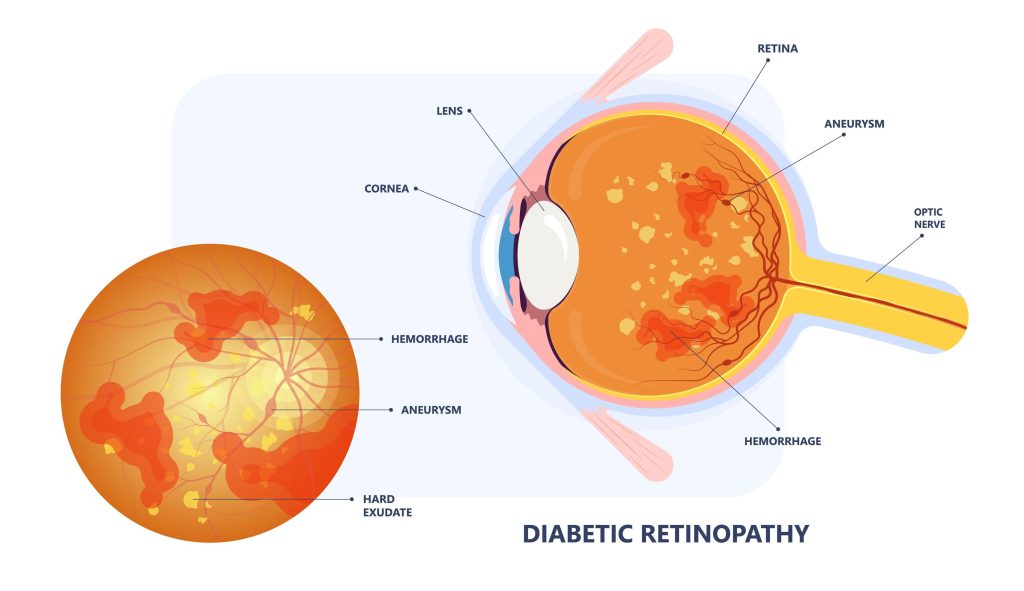
When Vision Begins to Fade
Imagine waking up one morning and seeing dark spots dancing across your vision—or worse, complete patches of blindness. It’s terrifying, especially when it creeps in slowly. This is the reality for thousands of people suffering from retinopathy, a group of conditions affecting the retina—the light-sensitive tissue at the back of the eye
In Delhi, Mahajan Eye Centre has become a trusted name for retinopathy surgery. Whether it’s diabetic retinopathy, hypertensive retinopathy, or retinal detachment, their team of retina specialists treats each case with personalized care.
What is Retinopathy?
Retinopathy refers to any disease that damages the retina, leading to vision impairment. The most common forms include:
Common Causes:
- Diabetic Retinopathy Due to uncontrolled blood sugar, common in diabetics
- Hypertensive Retinopathy Caused by long-term high blood pressure
- Retinal Vein Occlusion A blockage in the veins that drain blood from the retina
These conditions can cause symptoms like
- Blurred or fluctuating vision
- Floaters (tiny black or grey specks)
- Empty or dark areas in your vision
- Difficulty seeing at night
- Sudden and severe vision loss in advanced cases
In some cases, retinopathy can lead to blindness if untreated. The key lies in early diagnosis and intervention.
Mahajan Eye Centre: Trusted Experts in Retinal Surgery in Delhi
Founded by the renowned Dr. Deepankur Mahajan, Mahajan Eye Centre stands out for its retina services. With its clinic at Pitampura, Mahajan Eye Centre serves population in s in Pitampuraand nearby areas including Rohini, Ashok Vihar,and Karol Baghetc.,.Tthecentre has helped thousands of patients preserve or restore their vision with high success rates.
Why Mahajan Eye Centre?
- AIIMS-trained retina specialists with 15+ years of surgical experience
- Advanced retina imaging tools: OCT, FFA, wide-angle fundus cameras
- Minimally invasive surgical techniques (MIVS)
- Personalized treatment plans
- NABH-accredited facility ensuring high standards of hygiene and care
In a city as vast and competitive as Delhi, these benchmarks matter.
Types of Retinopathy Surgeries and Treatments Offered at Mahajan Eye Centre
1. Vitrectomy
This is the most common surgical procedure for advanced retinopathy. During a vitrectomy, the surgeon removes the vitreous gel from the eye and replaces it with a saline solution or gas bubble to allow the retina to heal properly.
Used for:
- Vitreous hemorrhage (bleeding in the eye)
- Retinal detachment
- Macular holes or epiretinal membranes
What to expect:
- Typically outpatient or day-care surgery
- Local or general anesthesia
- Visual recovery begins within days to weeks
2. Laser Photocoagulation
Laser therapy helps seal off leaking or bleeding vessels in the retina. While not “surgery” in the traditional sense, it is often performed alongside vitrectomy or used in earlier stages of retinopathy.
Used for:
- Diabetic retinopathy
- Retinal tears
- Vein occlusion
What to expect:
- Prevents worsening of vision
- Quick recovery
- Often done in under 20 minutes
3. Intravitreal Injections
Anti-VEGF injections (Avastin, Eylea, Lucentis) are directly injected into the eye to reduce swelling and abnormal vessel growth. Though not surgical, they are often a pre-surgical step or maintenance treatment after surgery.
Mahajan Eye Centre performs these injections under sterile conditions using topical anesthesia—usually a painless process.
What to Expect: The Patient Journey
Step 1: Initial Consultation & Diagnostic Tests:
You’ll undergo detailed testing including:
- Optical Coherence Tomography (OCT)
- Fundus Fluorescein Angiography (FFA)
- Retinal photography
- Visual field testing
These help map the retina in high resolution and plan the right treatment.
Step 2: Surgical Planning:
If surgery is recommended, you’ll be briefed about
- Procedure details
- Pre-surgical precautions
- Recovery timeline
- Post-operative medications
At Mahajan Eye Centre, every patient gets a detailed one-on-one consultation with the retina surgeon to resolve doubts and ease anxieties.
Step 3: The Procedure
Depending on the case, surgery may last from 30 minutes to over an hour. Most procedures are minimally invasive and performed under monitored anesthesia care.
Step 4: Post-Surgical Recovery
Patients are usually discharged the same day, with instructions to:
- Rest with the head in a particular position (in gas-bubble cases)
- Use eye drops regularly
- Avoid heavy lifting or dusty environments
- Attend regular follow-ups
Visual improvement can take a few weeks to months, depending on the extent of damage.
Why Acting Early Matters
The longer retinopathy is left untreated, the harder it becomes to recover lost vision. That’s why early diagnosis and timely surgical intervention can mean the difference between visual freedom and long-term dependence.
Mahajan Eye Centre advocates annual retinal checkups for all diabetics and hypertensive patients, even if you don’t have symptoms.
Conclusion: Your Vision Deserves Expert Care
If you or a loved one is facing signs of vision changes due to diabetes, blood pressure, or other systemic conditions—don’t wait. At Mahajan Eye Centre in Delhi, world-class retinal surgery meets compassionate care.
Whether you need diagnostic tests, second opinions, or surgical treatment, their team is ready to guide you at every step.


